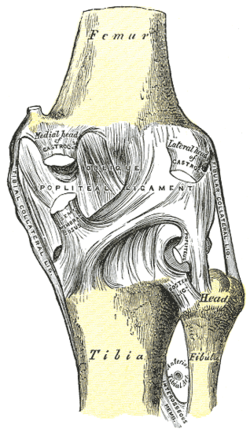The oblique popliteal ligament (posterior ligament) is a broad, flat, fibrous ligament on the posterior knee.[1] It is an extension of the tendon of the semimembranosus muscle.[1][2] It attaches onto the intercondylar fossa and lateral condyle of the femur.[2] It reinforces the posterior central portion of the knee joint capsule.[3]
| Oblique popliteal ligament | |
|---|---|
 Right knee-joint. Posterior view. (Oblique popliteal ligament visible at center.) | |
| Details | |
| From | Lateral epicondyle of the femur, lateral condyle of femur |
| To | Medial condyle of tibia |
| Identifiers | |
| Latin | ligamentum popliteum obliquum |
| TA98 | A03.6.08.013 |
| TA2 | 1899 |
| FMA | 44582 |
| Anatomical terminology | |
Anatomy
editThe oblique popliteal ligament is formed as a lateral expansion of the tendon of the semimembranosus muscle[2] and represents one of the muscle's five insertions.[citation needed] The ligament blends with the posterior portion of the knee joint capsule.[2] It exhibits a large opening through which nerves and vessels pass.[3]
Attachments
editThe ligament extends superolaterally from the semimembranosus tendon to attach onto the intercondylar fossa and lateral condyle of the femur.[2][3]
Relations
editThe oblique popliteal ligament forms part of the floor of the popliteal fossa;[citation needed] the popliteal artery lies upon the ligament.[2] The ligament is pierced by posterior division of the obturator nerve, as well as the middle genicular nerve, the middle genicular artery, and the middle genicular vein.[citation needed]
Clinical significance
editThe oblique popliteal ligament may be damaged, causing a valgus deformity. Surgical repair of the ligament often leads to better outcomes than conservative management.[4]
The oblique popliteal ligament may be cut during arthroscopic meniscus repair surgery.[5]
Additional images
edit-
Sagittal section of right knee-joint.
References
editThis article incorporates text in the public domain from page 340 of the 20th edition of Gray's Anatomy (1918)
- ^ a b Mehta, V; Dawani, P; Goel, P (September 2022). "Morphologic and Morphometric Evaluation of Oblique Popliteal Ligament - A Clinico-Anatomical Study". Maedica. 17 (3): 641–646. doi:10.26574/maedica.2022.17.3.641. PMC 9720660. PMID 36540577.
- ^ a b c d e f Chummy S. Sinnatamby (2011). Last's anatomy: regional and applied (12th ed.). Edinburgh. p. 138. ISBN 978-0-7020-4839-5. OCLC 764565702.
{{cite book}}: CS1 maint: location missing publisher (link) - ^ a b c Palastanga, Nigel; Soames, Roger (2012). Anatomy and Human Movement: Structure and Function. Physiotherapy Essentials (6th ed.). Edinburgh: Churchill Livingstone/Elsevier. p. 307. ISBN 978-0-7020-3553-1.
- ^ Berkson, Eric M.; Nolan, David; Fleming, Kristina; Spang, Robert; Wong, Jeff; Asnis, Peter; Kawadler, Jaeson (2016-01-01), Magee, David J.; Zachazewski, James E.; Quillen, William S.; Manske, Robert C. (eds.), "Knee", Pathology and Intervention in Musculoskeletal Rehabilitation (Second Edition), W.B. Saunders, pp. 713–773, doi:10.1016/b978-0-323-31072-7.00020-8, ISBN 978-0-323-31072-7, retrieved 2021-03-02
- ^ Nawab, Akbar; Hester, Peter W.; Caborn, David N. M. (2004-01-01), Miller, Mark D.; Cole, Brian J.; Cohen, Steven B.; Makda, Junaid A. (eds.), "Arthroscopic Meniscus Repair", Textbook of Arthoscopy, Philadelphia: W.B. Saunders, pp. 517–537, doi:10.1016/b978-0-7216-0013-0.50054-5, ISBN 978-0-7216-0013-0, retrieved 2021-03-02
External links
edit- Oblique popliteal ligament at the Duke University Health System's Orthopedics program
- lljoints at The Anatomy Lesson by Wesley Norman (Georgetown University) (postkneejointsuperfic)
- Anatomy photo:17:02-0400 at the SUNY Downstate Medical Center - "Major Joints of the Lower Extremity: Knee Joint"